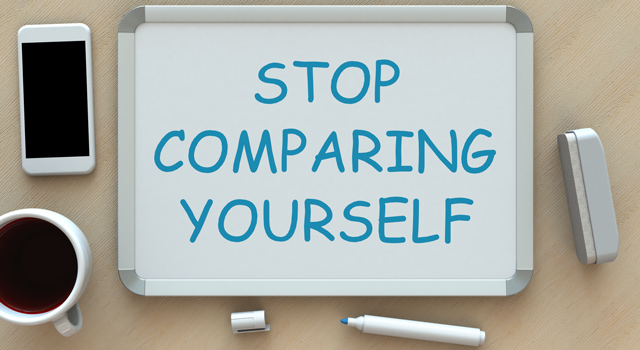What Is the Difference Between Identifying and Comparing?
When you’re identifying a problem, you’re recognizing an issue that is there. For instance, you can identify that you have a substance abuse problem and simply recognize that fact.
When you compare, you’re coming yourself to others or your situation to others’ situations. Your addiction is purely your own design; it may not have much in common with other people’s stories. You don’t need to be like the others around you in order to identify with them.
Essentially, identifying is understanding what you’re going through and being able to communicate that to others. However, comparing is a way of looking for differences between you and others, and that is a negative behavior that will only harm you during recovery.
Why Is It Important to Identify and Not Compare?
When you identify, you recognize your own personal worth as an individual. You don’t need to be like someone else or share a story with someone. Instead, you’re entirely your own person with your own experiences and story to tell.
If you compare yourself with others, you could do a few things that are detrimental to your recovery. You may:
- Minimize your substance abuse problem
- Feel less than those around you through comparison
- Become frustrated by your recovery
Why Does Comparing Minimize Your Problems?
Comparing yourself to others allows you to look for differences. For some people, those differences will make them feel bad about themselves. For others, they’ll look for ways in which they have succeeded or been less dependent on drugs or alcohol to make themselves feel better than those around them. For instance, if you’re listening to someone talk about his addiction and think, “Well, I never acted like that when I was high,” then you are comparing yourself to that person instead of listening and learning from his experiences. Understanding that you are different but share a common problem helps you identify with the people around you and share a common basis for your recovery.

Why Does Comparison Make You Feel Less Than Others?
Comparing yourself to others is a good way to feel less than them. For instance, if you fell into drug use at an early age, you may find that comparing yourself to someone who was able to quit at an early age makes you feel bad about your own choices.
Comparing your current mental and physical state to others in a recovery group can also make you feel inadequate or behind, and that’s not something that is good for you or those around you. Feeling like you’re less than others makes it harder for you to interact and share your true feelings, and it may make you feel that you have to lie or be quiet during sessions to not stand out in the crowd.
Why Can Comparison Make You Frustrated During Recovery?
Comparing your recovery to the recovery others are having can be frustrating, particularly if the people around you are recovering at a faster pace. Everyone has a different body, different chemistry in the brain, and other external and internal factors that affect recovery. There is no way to compare yourself to others because no one started as an equal. Each of you has your own story, your own type of addiction, and your own battles to face.
How Can Identifying Help Me?
Instead of thinking of your recovery as a challenge or trying to fit into a pecking order, focus on your own personal challenges and how you can use your experiences to help others. You want to be with others who you can identify with because you can see how another person’s story relates to your own and gain new insights into your own recovery.
There are people in your group meetings that you may never have mixed with in your normal life. Different races, religions, genders, and people of different political views and sexual orientations. Because of this, you can learn so much about people and the different views on addiction and recovery they have. One of those people may say something that motivates you, or you may find that you have something in common with someone that you would have never thought possible. Coming together and forming friendships and relationships is important to your recovery, and identifying with the people around you allows you to do that without becoming competitive. It takes you one step closer to achieving emotional sobriety and a healthy well-being.
How Can I Learn More About Comparing and Identifying in Recovery?
When you’re ready to start identifying with others, you can take the next step in your recovery. To learn more about how you can apply this structure to your life, call us today by dialing 1-559-272-7775 to speak with someone who can help. If you prefer to visit us online and want to learn more about the recovery programs in your area, you can visit us at www.firststepsrecovery.com. We are here to support you as you move forward, including through our comprehensive residential rehabilitation programs.




